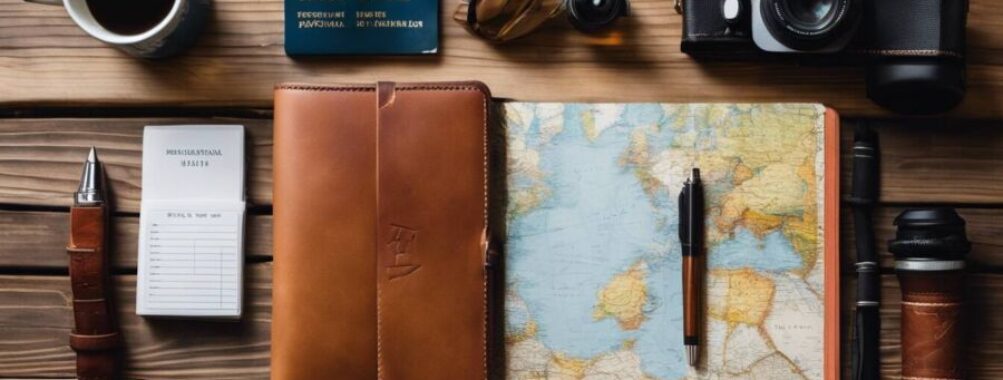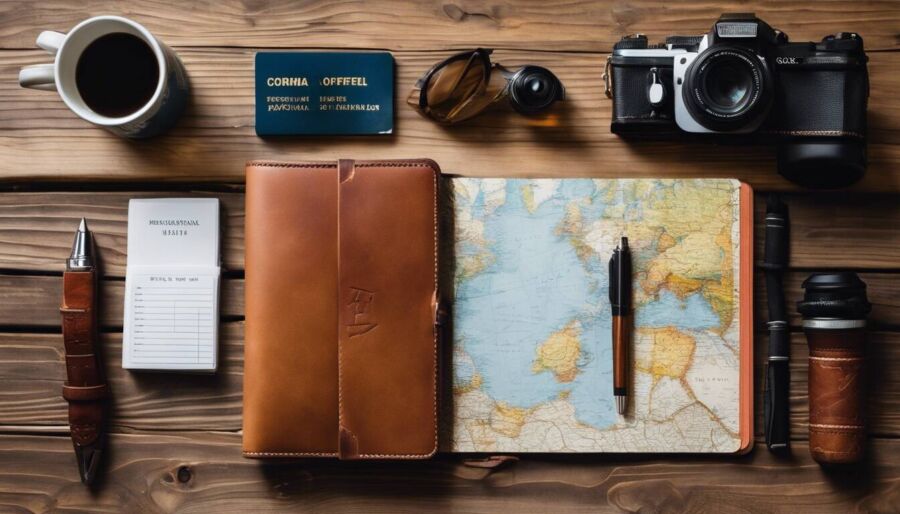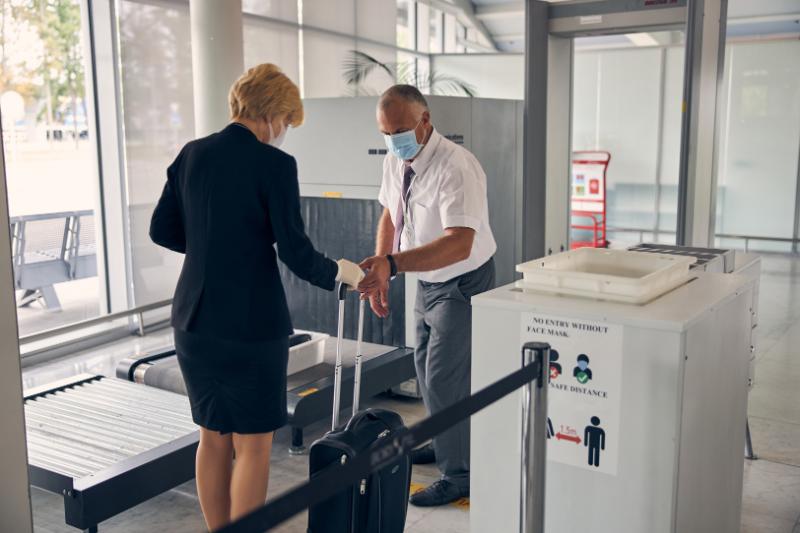
Vacation Budget Tips: How to Travel on a Budget and Save Money
Saving money on vacation starts with a good plan. Accounting for all expenses like accommodation, meals, transport, and activities at your chosen destination lets you control costs. However, knowing these costs is not enough. An unexpected twist can be managing daily spending and keeping aside an emergency fund for unforeseen circumstances, as nothing derails a budget more than unplanned costs. Let’s begin with understanding the costs of the destination.
When budgeting for a vacation, consider all potential expenses such as transportation, accommodation, food, activities, and shopping. To effectively manage your vacation budget, prioritize essential expenses, research cost-saving options like off-peak travel times and alternative accommodations, and plan for unexpected costs.

Table of Contents
- Establish A Realistic Budget for Your Vacation
- Plan Ahead for Contingencies
- Insider Tips to Minimize Expenses
- Off-Peak Travel: Embrace the Shoulder Seasons
- Use Travel Rewards: Maximize Your Perks
- Local Public Transportation: Immerse Yourself in Local Living
- Affordable Accommodations
- Hostels and Guesthouses
- Vacation Rentals
- Cost-Effective Travel and Transport
- Be Flexible with Your Flight Dates
- Embrace Ride-Sharing and Carpooling
- Frugal Dining Out While Traveling
- Economical Entertainment and Activities
- Precautions against Overspending
- Set a Realistic Daily Spending Limit
- Keep Track of Your Expenses
- Book Your Dream Experience
- More Travel Guides
Establish A Realistic Budget for Your Vacation
When planning a vacation, it’s essential to start by researching the costs associated with your destination. Consider the prices for accommodations, meals, transportation, and activities to create a comprehensive budget.
Research Destination Costs: The first step in establishing a realistic vacation budget is to gather information about the typical costs at your chosen destination. Websites, travel guides, and forums can provide valuable insights into the average prices of hotels, rental properties, and even alternative accommodations such as hostels or bed and breakfasts. A well-researched approach enables you to set realistic spending limits for each trip aspect, ensuring you don’t overspend.
For instance, if you’re planning a beach getaway, consider the various costs such as beachfront hotels vs. accommodations a few blocks away from the beach. Additionally, familiarize yourself with local food prices—identify whether there are affordable dining options or if eating out tends to be expensive. Collecting this information early on can avoid financial surprises during your trip and maintain control over your expenses.
Set Spending Limits: Once you understand the costs involved, allocate specific amounts within your budget for different aspects of your trip. Consider setting limits for lodging, food, tours, and souvenirs to ensure you stay within your means.
For example, if accommodation expenses typically account for the largest portion of vacation budgets, you may want to prioritize finding cost-effective lodging options to free up funds for experiences or dining. By taking the time to establish these limits upfront, you can better manage your resources and enjoy peace of mind while traveling.
Plan Ahead for Contingencies
It’s crucial to anticipate unforeseen circumstances during your vacation. This involves setting aside a small portion of your budget as a safety net in case of unexpected expenses or emergencies.
Consider unforeseen medical emergencies or transport expenses due to unforeseen closures or event cancellations. Planning ensures peace of mind so you can focus on enjoying your trip instead of worrying about finances.
By conducting thorough research, meticulously setting spending limits, and planning for contingencies, you’ll create a practical vacation budget that allows you to enjoy your travels without the stress of overspending.
Insider Tips to Minimize Expenses

Traveling on a budget doesn’t mean missing out—it just means you approach things a little differently. Here are some savvy tips that can dramatically reduce your expenses while traveling, making your vacation as affordable as it is memorable.
Off-Peak Travel: Embrace the Shoulder Seasons
When planning your trip, consider visiting your destination during its off-peak season. **This is often called the “shoulder season”**—the period between high and low seasons when crowds are thinner and prices are lower.
You’ll find accommodations, airfare, and activities at significantly reduced prices by choosing to travel during this time. Plus, you’ll be able to enjoy popular attractions and sights without the overwhelming crowds that the peak season brings. It’s like getting a front-row seat at a concert without the chaos of the mosh pit.
For instance, if you’re heading to Europe, visiting in autumn or spring instead of summer can lead to substantial savings on everything from flights to hotel stays. Plus, you can revel in the breathtaking beauty of changing seasons without burning a hole in your pocket.
Use Travel Rewards: Maximize Your Perks
Leverage travel reward programs and credit card points to reduce flights, accommodations, and rental car costs. Many airlines and hotels offer loyalty programs that allow you to earn points every time you book with them.
Accrued points can be redeemed for free or heavily discounted flights and hotel stays, significantly reducing overall travel expenses. It’s like having a magic wand that makes part of your vacation expenses disappear!
Local Public Transportation: Immerse Yourself in Local Living
Instead of reaching for a costly taxi every time you need to get around, opt for local public transportation such as buses, trains, or trams. Not only does this offer major savings, but it also provides an authentic experience of local culture—meeting people from all walks of life and seeing parts of the city that may remain unseen to typical tourists.
Think about all the amazing stories you might hear and the incredible local street art you could discover.
By taking advantage of these insider tips, you can significantly minimize your expenses while enjoying an enriching travel experience without breaking the bank.
With these money-smart strategies, it’s time to explore the next vital aspect of budget-friendly travel—finding affordable accommodations.
Read Also: What Is a Reasonable Vacation Budget? Complete 2025 Cost Breakdown & Planning Guide
Affordable Accommodations
When planning a trip and looking to save money, one of the best ways to cut costs is by finding affordable accommodations. The good news is that plenty of options provide comfortable and clean places to stay without draining your wallet.
Hostels and Guesthouses
One great option for budget travelers is hostels. These are shared accommodations where you can rent a bed in a dormitory-style room. They often have communal areas where you can meet other travelers, making them perfect for socializing and getting insider tips on local attractions. Hostels are significantly cheaper than hotels, allowing you to allocate more funds towards experiences and adventures during your trip.
Another fantastic option is guesthouses. Locals usually run smaller establishments, offering a cozy and intimate setting. Most guesthouses provide clean and comfortable accommodations at a fraction of the cost of hotels, allowing you to experience local hospitality and culture while staying within your budget.
Vacation Rentals
Vacation rentals through platforms like Airbnb or VRBO have become increasingly popular among budget-savvy travelers. They often provide more space and amenities for a lower price than traditional hotels. With vacation rentals, you can find everything from a single room in someone’s home to an entire apartment or house for your stay.
These options are ideal if you’re traveling with family or friends. They offer the convenience of shared spaces and kitchens, which can save you money on dining out. Plus, many hosts provide helpful tips for exploring the area as well as insider recommendations for local eateries and activities.
For instance, booking an affordable vacation rental in a neighborhood away from touristy areas can save money and offer an authentic glimpse into the local lifestyle. You might find hidden gems, local markets, and quirky cafes that you wouldn’t have discovered if you stayed in a standard hotel.
Ultimately, exploring these budget-friendly accommodation options allows you to make the most of your travel budget while enjoying a comfortable and enriching experience during your journey. Remember, it’s all about finding the right balance between comfort, affordability, and local experiences.
As we’ve seen how choosing affordable accommodations can significantly impact your travel budget, let’s now shift our focus to another critical aspect—cost-effective travel and transportation options.
Cost-Effective Travel and Transport

Travel and transportation can be a significant expense while on vacation, but several smart strategies can help you cut down on those costs without sacrificing comfort and convenience. Let’s explore some practical ways to save money without compromising the enjoyment of your trip.
Be Flexible with Your Flight Dates
One of the most effective ways to save money on flights is by being flexible with travel dates. Airfare prices can vary significantly depending on the day of the week and the time of year. Flying mid-week or during off-peak hours can result in considerable savings. Additionally, watch for special promotions and sales offered by airlines, which can be excellent opportunities to book affordable flights.
You might also consider using price comparison websites or flight deal alerts to monitor ticket prices and seize the best deals when they become available.
Embrace Ride-Sharing and Carpooling
For short distances at your destination, consider using ride-sharing services or carpooling with other travelers instead of renting a car or taking expensive cabs. This helps you save money and reduces your carbon footprint by minimizing the number of vehicles on the road.
Imagine this: You’re traveling from the airport to your hotel, which is only a short distance away. Hopping into a shared ride with fellow travelers or utilizing a ride-sharing service could be a convenient and cost-effective alternative to splurging on an individual taxi ride or expensive private transportation.
In the next section, we will explore other creative ways to maintain a budget-friendly approach when exploring your destination and making the most out of your trip without breaking the bank.
Frugal Dining Out While Traveling
Exploring local street food markets when you’re traveling can be an excellent way to experience authentic cuisine without breaking the bank. From sizzling kebabs in Istanbul to mouthwatering tacos in Mexico City, street food offers a taste of the local culture at a fraction of the cost of sit-down restaurants. The aromas, flavors, and bustling atmosphere make it an integral part of the travel experience, allowing you to enjoy delicious meals, interact with locals, and immerse yourself in the community – a win-win situation for your appetite and your wallet.
In Bangkok, Thailand, the vibrant street food scene is renowned for its flavorsome dishes like pad Thai and green curry. Meanwhile, in Marrakech, Morocco, you can savor tagine and couscous from bustling souk stalls. Exploring street food markets has a charm of its own and offers an opportunity to partake in the flavors of a destination in a way that high-end restaurants often cannot replicate.
Consider visiting local grocery stores or markets for budget-friendly meal options as well. Buying snacks or groceries for breakfast and lunch can help you save on dining out expenses. Whether it’s fresh fruit, local bread, or cheese, these simple items can serve as quick and inexpensive meals when you’re on the go. Additionally, preparing simple picnics or meals in your accommodation allows you to save money and still indulge in tasty local fares.
With these tips in mind, you can indulge in exceptional local cuisine without blowing your budget.
Economical Entertainment and Activities
Entertainment and activities are vital aspects of any vacation. They add color to your travel experience but can sometimes constitute a significant portion of your budget. But fear not, there are many ways to enjoy your trip without overspending.
A fantastic tip is to seek out free attractions and activities like public parks, beaches, or museums with free admission days. In some cities, you can find walking tours led by knowledgeable locals who provide insights into the area’s history and culture based on tips alone.
Additionally, consider looking into city passes or tourist discount cards. These can reduce prices for multiple attractions and might include public transportation within the destination. It’s like a golden ticket that opens various doors for you to explore different aspects of the city’s culture and history without draining your wallet.
For instance, many major cities offer passes that allow access to several popular tourist spots at a significantly reduced price compared to buying individual tickets. Some even include perks like skipping lines or additional discounts at affiliated restaurants.
When researching potential destinations, watch for free events and local festivals during your visit. Attending these gives you a glimpse into the local culture and is often a budget-friendly way of enjoying performances, art shows, or live music.
Exploring well-kept secrets rather than just heading to famous landmarks reveals a destination’s true identity while stretching your vacation dollars further.
In finding a balance between keeping finances in check and fully immersing yourself in a new travel experience, seeking out free attractions and using discount cards can truly unlock a world of exploration without spending excessively.
Precautions against Overspending
While it’s important to have a great time on vacation, it’s equally important not to end up with a hefty bill by the end of it. Here’s how to take precautions against overspending and stick to your vacation budget without sacrificing too much fun.
Set a Realistic Daily Spending Limit
One of the best ways to ensure you don’t spend more than planned is to set a daily spending limit based on your overall budget. This limit should cover all your essential expenses such as food, transport, and any activities or attractions you plan to visit.
Setting a defined boundary for each day reduces the risk of impulse purchases or splurging on non-essential items. This helps control spontaneous spending and gives you a clear picture of your daily financial limits, helping you stay within your budget constraints.
Keep Track of Your Expenses
Keeping track of your expenses is crucial when traveling. Whether you jot down every expenditure in a travel journal or use a budgeting app, it’s essential to document every penny spent. This helps you stay accountable to your allocated budget and gives you real-time insights into how much money you have left for the remaining days of your trip.
By monitoring each transaction, big or small, you can identify any patterns or areas where you may be overspending, allowing you to adjust accordingly. These small adjustments can make a big difference in ensuring you stay on track with your budget throughout your journey.
Neglecting these precautions can lead to unexpected financial strain and disrupt the enjoyment of your trip. By taking these steps, however, you are setting yourself up for success in staying within your budget without compromising on experiences.
With these simple but effective precautions, you’ll be well-equipped to manage your expenses and avoid any unwanted financial stress during your travels.
Staying within a vacation budget requires careful planning and discipline, but it doesn’t mean sacrificing the enjoyment of your trip. With the right approach, you can experience fantastic activities while keeping your finances in check.



